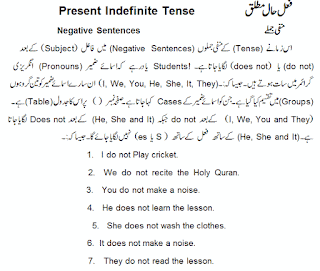Present Perfect Tense (Interrogative Sentences)
Es tense k sawaliya jumlo yani (interrogative sentences mai imdadi af'aal yani helping verbs jumly k shoru mai likhty hain. Aor jumly k aakhir mai sawaliya nishan lagaya jata hai. jaisa keh: 1. Have i cut the crops? 2. Have we flewn the kite? 3. Have you taken a bath? 4. Has he ridden on horse? 5. Has she completed the homework? 6. Has it watched the T.V? 7. Have they planted the trees? 8. Has Aslam made a fire? Have helping verb Has helping verb I subject or pronoun We subject or pronoun You subject or pronoun He subject or pronoun She subject or pronoun It subject or pronoun They subject or pronoun Cut verb "3rd form" Flewn verb "3rd form" Taken verb "3rd form" Ridden verb "3rd form" Completed verb "3rd form" Watched verb &qu


